http://www.ted.comTED is a small nonprofit devoted to Ideas Worth Spreading. It started out (in 1984) as a conference bringing together people from three worlds: Technology, Entertainment, Design. Since then its scope has become ever broader. Along with the annual TED Conference in Long Beach, California, and the TEDGlobal conference in Oxford UK, TED includes the award-winning TEDTalks video site, the Open Translation Program, the new TEDx community program, this year's TEDIndia Conference and the annual TED Prize.
On TED.com, we make the best talks and performances from TED and partners available to the world, for free. More than 500 TEDTalks are now available, with more added each week. All of the talks feature closed captions in English, and many feature subtitles in various languages. These videos are released under a
Creative Commons license, so they can be freely shared and reposted.




